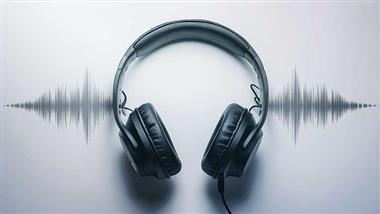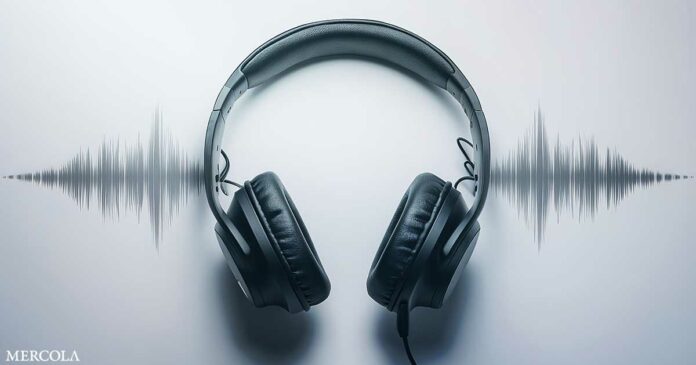
Story at-a-glance
- Noise-canceling headphones work by creating opposing sound waves to cancel outside noise, originally developed for pilots but now widely used in everyday life
- These headphones offer benefits including stress reduction, improved focus and better sound quality at lower volumes, particularly in noisy environments, but they carry risks
- Extended use may cause auditory processing difficulties as your brain becomes less adept at filtering background noise, leading to hearing issues despite normal hearing tests
- Experts express concern that overuse could impair listening skills and your brain’s ability to process environmental sounds
- To minimize risks, follow the 60/60 rule (60% volume for 60 minutes), take regular breaks and use noise-canceling headphones selectively rather than constantly
Imagine you’re on a crowded bus, noise-canceling headphones snug over your ears, your favorite song drowning out the chaos. It’s peaceful, but have you ever stopped to think if this daily escape is interfering with your hearing? Noise-canceling headphones are everywhere, helping you block out the world.
Yet, there’s a growing question: could they secretly harm your ears? With millions using them every day, understanding their effects is important for keeping your hearing sharp. Let’s dive into how they work, their benefits, the risks and what experts say, plus how to make using them safer.
How Do Noise-Canceling Headphones Work?
You’ve probably wondered how these headphones magically hush the world.
- Picture sound as waves crashing on a beach — Noise-canceling headphones listen to outside racket — like chatter or traffic — then send out opposite waves to cancel it out. What’s left? Silence, or just the music or podcast you want to hear. It’s like a tug-of-war where the noise loses.
- Noise-canceling technology isn’t new — It started decades ago with pilots who needed to hear over roaring plane engines. Today, it’s in your hands, changing how you experience sound daily. There are two kinds of noise-canceling headphones: active ones use smart tech to fight noise, while passive ones rely on thick padding to block it. Most pairs you own probably blend both, giving you that quiet bubble.
Are There Any Benefits of Noise-Canceling Headphones?
Let’s talk benefits — because there’s a reason so many people reach for these headphones.
- Stress and anxiety relief — Ever notice how calm you feel when the background buzz fades? By cutting out noise, they lower your stress and anxiety, acting like a shield against chaos.1 It’s a little break for your mind.
- They’re a focus booster — Picture working in a loud café or studying with roommates chatting nearby. Noise-canceling headphones help you tune out distractions and zero in on what matters.
- Love music? These headphones make every note pop without you cranking the volume. You get a richer sound experience at lower levels. And in loud spots — like a busy street — they let you listen at a lower volume instead of blasting to compete with the background noise. But is there a catch?
The Hidden Dangers Lurking in Silence
Now, here’s where it gets tricky. Some experts worry these headphones have downsides. One big concern? Overusing them could confuse your brain about sound. It’s called auditory processing disorder — fancy words for trouble sorting out noises around you.2
If you block everything too much, your brain struggles later without that quiet bubble. In other words, constant isolation from environmental sounds could be training your brain to ignore background noise too well. Additional risks include:
- Auditory processing difficulties — Too much silence makes your brain less skilled at picking out sounds. This leads to problems understanding conversations or telling sounds apart in noisy places. This is due to the brain “forgetting” how to filter these sounds.
- Increases in hearing issues — Medical professionals have noted a trend of younger individuals with hearing difficulties, despite having normal hearing tests. This raises questions about the role of noise-canceling headphones.3
- Tinnitus and ear discomfort — Using headphones at high volumes for extended periods can cause tinnitus, a constant ringing or buzzing in the ears. Some people also report ear pressure, especially with active noise cancellation, leading to headaches or discomfort.
- Sound direction problems — Using noise-canceling headphones a lot makes it harder to tell where sounds are coming from, which could be unsafe in some places.4
- Becoming more sensitive to noise — If you block out everyday sounds too much with noise-canceling headphones, normal noises seem too loud when you take the headphones off.5
Think of your brain like a muscle. If it stops flexing with everyday sounds — like birds or footsteps — it gets rusty at handling them. Later, without headphones, the world could feel too loud or jumbled. It’s not guaranteed, but it’s a risk to consider.
Further, even with noise-canceling, turning the volume way up still hurts your ears over time. You might not feel it now, but the damage creeps in. And wearing them for hours tires your ears out and feels uncomfortable — a reminder that too much of a good thing isn’t always great.
What the Experts Say
So, what do the pros think? A BBC report shared stories of people noticing hearing shifts after heavy noise-canceling headphone use, raising red flags.6 It’s not hard proof, but it’s enough to make you pause. How you use them also affects their risks — volume and time matter most.
- Listening skills suffer — Experts like Renee Almeida from Imperial College Healthcare NHS Trust states your brain needs to hear background noise to understand what’s most important to focus on. “There is a difference between hearing and listening,” she told BBC. “We can see that listening skills are suffering.”7
- “Forgetting” auditory input — Claire Benton, vice president of the British Academy of Audiology, says your brain could forget how to filter out background noise, like honking cars, if you wear noise-canceling headphones too much.8
- EMF exposure — Along with hearing concerns, headphones, especially wireless varieties, also expose you to electromagnetic fields (EMFs), raising additional health concerns.
Still, audiologists — ear experts — say there’s no slam-dunk evidence of big harm yet. They’re keeping an eye on it, though, because it’s a hot topic. Some argue the benefits outweigh risks; others want more research. The jury’s still out, but it’s smart to listen up.
How to Protect Your Hearing While Using Your Headphones
Not using noise-canceling headphones is the surest way to avoid their associated risks. However, if you plan to use them, moderation is key.
- Take frequent breaks — Give your ears a breather at least every hour. Pop them off and let natural sounds — like birds or chatter — flow back in. It’s like a reset button for your hearing.
- Try the 60/60 rule — Keep the volume at 60% or less and limit sessions to 60 minutes. It’s an easy way to cut risks, and your ears will thank you. You can use a phone app to check if your volume is too loud.
- Don’t lean on noise-canceling all the time — In quiet spots, let your brain practice hearing the world — it keeps your senses sharp. And get your hearing checked yearly. If things sound muffled, catching it early saves you trouble later.
Keep Your Ears Happy
Noise-canceling headphones have their place — they block noise, sharpen your focus and make music sing. But they’re not risk-free. Overdoing it or pumping the volume could quietly ding your hearing. Your ears are precious, so staying smart about how you use these gadgets keeps them humming for years. Remember: take breaks, keep the volume down, use noise-canceling wisely and check your hearing regularly.
FAQs About Noise-Canceling Headphones and Hearing
Q: Can noise-canceling headphones damage your hearing?
A: Not directly, but cranking the volume too high or using them too long might hurt your ears over time. Consider being mindful of the duration of use to minimize strain on your auditory system.
Q: What’s the safest way to use them?
A: Not using them at all is the surest way to eliminate their risks. But if you do use them, follow the 60/60 rule — 60% volume, 60 minutes max — and take breaks. Your ears need rest too. Implementing these guidelines helps to mitigate the risk of overexposure to loud sounds and auditory fatigue.
Q: Why do my ears feel tired after wearing headphones?
A: Hours of use strain them. Give your ears a break every hour to feel fresh again. This fatigue is a signal that your ears need a rest from directed sound and a chance to readjust to ambient noise.
Q: Are there benefits to noise-canceling headphones?
A: They cut stress, boost focus and improve sound quality. However, these advantages are most effectively realized when used responsibly and in appropriate situations where noise reduction is genuinely beneficial.
Q: Should I use noise-canceling headphones in quiet environments?
A: It’s best to let your ears experience natural sounds in quiet places. Using noise-canceling headphones excessively even in quiet settings hinders your brain’s natural ability to process and filter everyday sounds effectively.
Source: Source link
Publish Date: 4/3/2025 12:00:00 AM

